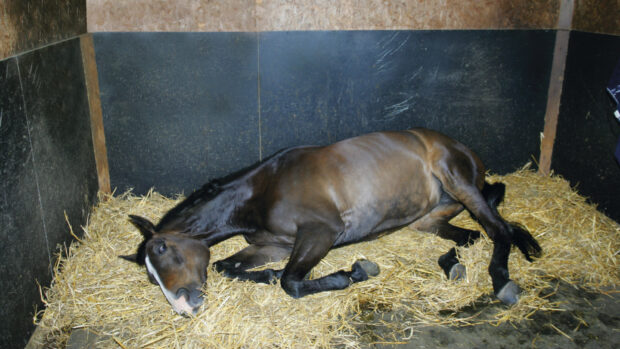A horse’s chances of surviving colic surgery have improved greatly during the past 35 years. Significant improvements have been made. Earlier referral of cases for surgery, specialist training of surgeons and anaesthetists, developments in anaesthetics and advances in post-operative care have bettered the outcome for horses with colic. The end result is that surgery is performed more commonly and the patient’s chances of survival have improved significantly.
What does colic surgery for horses involve?
Fortunately, of all the horses with colic, less than 10% require surgery to save their lives. However, when colic surgery is required, it is a major job involving a team of skilled surgeons, anaesthetists and nursing staff. Severe colic can occur at any time of day or night, so a trained team needs to be available 24hr a day, 365 days a year, which is why this type of surgery is performed in a relatively small number of equine hospitals.
Colic cases needing surgery present a challenge, as they usually need to be operated on quickly and kept under anaesthesia for as short a time as possible. The risks associated with anaesthesia in horses are greater than in humans or dogs, and these risks are even greater with colic, due to the harmful effects of toxins released from the intestine.
In many cases, it is impossible to know what the exact problem is until surgery is under way and the abdomen can be examined properly. In some instances, such as when intestine has ruptured or when severely injured intestine cannot be removed, the chances of recovery may be so small that the surgeon may advise that the patient be euthanased while under anaesthesia.
Post-operative care after colic surgery
Following colic surgery, some horses make an uneventful recovery and can return home within five to seven days. For others, it may be a roller-coaster ride of ups and downs, requiring several days of intravenous fluids and intensive medical care — or, in the worst cases, repeat surgery.
The most common problems encountered in the first few days after surgery are:
- the effects of endotoxaemia (toxins released by damaged gut)
- ileus (where the intestine becomes “paralysed”)
- continued abdominal pain.
In common with humans, adhesions (scar tissue) can be a major problem following abdominal surgery in the horse and these may go undiagnosed. These adhesions have the potential to cause signs of colic in the weeks or months after surgery.
Once discharged from the hospital, colic patients require several weeks of box-rest to allow the abdominal incision to heal, followed by periods of controlled turnout and gradually increased exercise. Most patients can return to gradually increasing work within four to six months.
Success rates of colic surgery in horses
Currently, around 80% of horses undergoing colic surgery at specialist clinics will return home and research has shown that the prognosis may be just as good for an older pony as a fit, young Thoroughbred.
The prognosis for individual patients will vary depending on the type and severity of the problem, and mortality rates are highest in the first few days after surgery.
Several studies have shown that horses suffering from severe endotoxic shock beforehand stand less chance of survival following surgery. Typically, they have severely damaged intestine that requires removal and colic will have been going on for many hours. In addition, reduced survival has been associated with resection of intestine, post-operative ileus and repeat abdominal surgery (laparotomy).
Once horses have recovered from the effects of surgery and the incision has healed fully, there is no reason why they cannot return to their previous jobs. There are many examples of horses who have recovered from colic surgery and have gone on to compete internationally in all disciplines.
Research has shown that the most common problem encountered after discharge from the clinic is colic, so one or more episodes in the year after surgery may not be unexpected. Many of these episodes are minor and cause no further problems, but some may be more severe, requiring further surgery or euthanasia.
These episodes are usually thought to be associated with adhesion formation, particularly after small intestinal surgery, or recurrence of the problem (more common in certain large colon disorders).
So is colic surgery in horses worth it?
The prognosis is good for most horses and ponies undergoing colic surgery, provided it is undertaken early. A delay of several hours in a horse with intestinal strangulation — where the blood supply to the intestine is lost — can change the prognosis from good to extremely poor.
The costs involved are anything from £2,000 upwards, depending on various factors. This is due to the number of skilled personnel required and the expense of medical therapy; for example, anaesthetics and intravenous fluids are more expensive for a horse than a much smaller animal. Invariably, the horses that are extremely sick when they arrive at the clinic tend to require more intensive — and expensive — care following surgery, but, even in horses that appear to stand a good chance of survival, unexpected complications may occur.
Unfortunately, there is no guarantee of success and an owner may be left with a large bill and no horse. Good communication between owners and carers of horses undergoing colic surgery, the hospital team and the referring vet is vital to discuss the patient’s chance of survival, likely complications, costs and aftercare following discharge from the clinic.
Continued research will further improve survival rates following colic surgery and, in common with humans, some focus will be on minimising the harmful effects of endotoxins and preventing adhesions forming. However, the single most important factor in giving a horse or pony the best chance of survival following colic surgery remains early referral.
- This veterinary feature was first published in Horse & Hound



